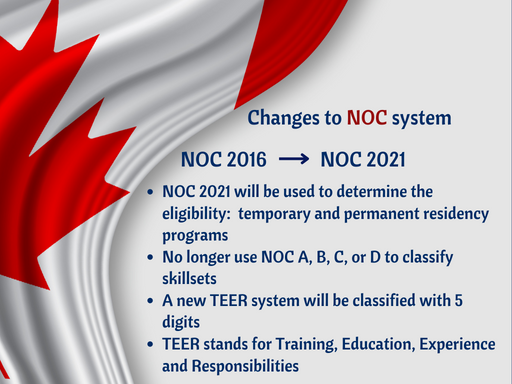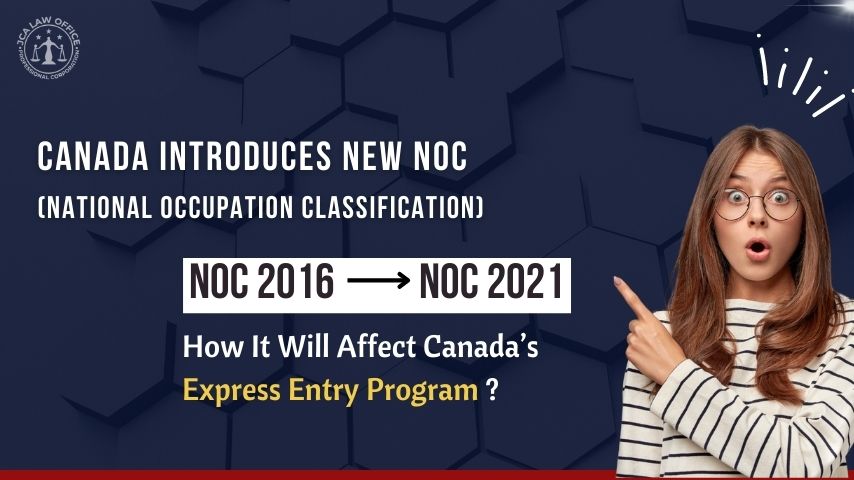How It Will Affect Canada’s Express Entry Program?
Beginning November 2022, the National Occupational Classification (NOC) 2021 version will be used by the Immigration, Refugees and Citizenship Canada (IRCC) to determine the eligibility of occupations under both temporary and permanent residency programs.

The changes will reflect the following:
- Four Category Skill Level Structure will be replaced by six-category level under the new TEER system;
- Sixteen additional eligible occupations for Express Entry;
- Five-digit codification system to replace the current four-digit system.
What are the changes in the Four-Category Skill Structure?
The current four-category NOC skill level structure will be replaced by a six-category level that will show the required Training, Education, Experience, and Responsibilities (TEER) for every occupation. The TEER system will assess the level of training, of formal education, of experience required to gain entry into each occupation, and the responsibilities associated to it which is more precise than simply assessing the level of skills.
| NOC 2016 | NOC 2021 | ||
|---|---|---|---|
| Skill Type 0 | Management occupations | TEER 0 | Management jobs (usually require a degree) |
| Skill Type A | Occupations usually require university education. | TEER 1 | Completion of a university degree (bachelor’s, master’s, or doctorate); or Several years of experience in a specific occupation from TEER category 2 (when applicable) |
| Skill Type B | Occupations usually require college education, specialized training or apprenticeship training. | TEER 2 | Completion of a post-secondary education program of two to three years at community college, institute of technology or CÉGEP; or Completion of an apprenticeship training program of two to five years; or Occupations with supervisory or significant safety (police officers and firefighters) responsibilities; or Several years of experience in a specific occupation from TEER category 3 (when applicable). |
| TEER 3 | Completion of a post-secondary education program of fewer than two years at community college, institute of technology or CÉGEP; or Apprenticeship training of fewer than 2 years; or More than six months of on-the-job training, training courses, or specific work experience with some secondary school education; or Several years of experience in a specific occupation from TEER category 4 (when applicable). |
||
| Skill Type C | Occupations usually require secondary school and/or occupation-specific training. | TEER 4 | Completion of secondary school; or Several weeks of on-the-job training with some secondary school education; or Several years of experience in a specific occupation from TEER category 5 (when applicable). |
| Skill Type D | On-the-job training is usually provided for occupations. | TEER 5 | Short work demonstration and no formal educational requirements |
| NOC 2016 | |
|---|---|
| Skill Type 0 | Management occupations |
| Skill Type A | Occupations usually require university education. |
| Skill Type B | Occupations usually require college education, specialized training or apprenticeship training. |
| Skill Type C | Occupations usually require secondary school and/or occupation-specific training. |
| Skill Type D | On-the-job training is usually provided for occupations. |
| NOC 2021 | |
|---|---|
| TEER 0 | Management jobs (usually require a degree) |
| TEER 1 | Completion of a university degree (bachelor’s, master’s, or doctorate); or Several years of experience in a specific occupation from TEER category 2 (when applicable) |
| TEER 2 | Completion of a post-secondary education program of two to three years at community college, institute of technology or CÉGEP; or Completion of an apprenticeship training program of two to five years; or Occupations with supervisory or significant safety (police officers and firefighters) responsibilities; or Several years of experience in a specific occupation from TEER category 3 (when applicable). |
| TEER 3 | Completion of a post-secondary education program of fewer than two years at community college, institute of technology or CÉGEP; or Apprenticeship training of fewer than 2 years; or More than six months of on-the-job training, training courses, or specific work experience with some secondary school education; or Several years of experience in a specific occupation from TEER category 4 (when applicable). |
| TEER 4 | Completion of secondary school; or Several weeks of on-the-job training with some secondary school education; or Several years of experience in a specific occupation from TEER category 5 (when applicable). |
| TEER 5 | Short work demonstration and no formal educational requirements |
Changes in Occupational Eligibility
With the implementation of NOC 2021, Express Entry Cut Off will be TEER 3. A total of sixteen (16) new occupations will become eligible for Express Entry, these are:
- Payroll administrators;
- Dental assistants and dental laboratory assistants;
- Nurse aides, orderlies and patient service associates;
- Pharmacy technical assistants and pharmacy assistants;
- Elementary and secondary school teacher assistants;
- Sheriffs and bailiffs;
- Correctional service officers;
- By-law enforcement and other regulatory officers;
- Estheticians, electrologists, and related occupations;
- Residential and commercial installers and servicers;
- Pest controllers and fumigators;
- Other repairers and servicers;
- Transport truck drivers;
- Bus drivers, subway operators, and other transit operators;
- Heavy equipment operators; and
- Aircraft assemblers and aircraft assembly inspectors.
On the other hand, three (3) occupations will become ineligible: a) other performers; b) program leaders and instructors in recreation, sport, and fitness; and c) tailors, dressmakers, furriers, and milliners. In any event, according to an internal briefing memorandum, these occupations may still be eligible for programs with broader occupational eligibility criteria and possible streams under the Provincial Nominee Program.
For the Atlantic Immigration Program (AIP), it is currently open to occupations that are categorized as Skill Level C or above. For NOC 2021, TEER 4 will be the cut-off for its Express Entry.
Twelve occupations will become ineligible for the AIP: Pet Groomers and animal care workers, Other support occupations in personal services, Longshore workers, Material handlers, Taxi and limousine drivers and chauffeurs, Delivery service drivers and door-to-door distributors, Boat and cable ferry operators and related occupations, Livestock labourers, Nursery and greenhouse labourers, Trappers and hunters, Food and beverage servers, Labourers in textile processing and cutting.
Changes in NOC Codification
NOC 2021 will use the new five-digit codification system as follows:
| Hierarchy | Digit Order | Definition |
|---|---|---|
| Broad Category | 1st Digit X | Occupational categorization |
| Major Group | 2nd Digit XX | TEER categorization |
| Sub-Major Group | XX.X | Top level of the Sub-Major Group |
| Minor Group | XX.XX | Hierarchy within the Sub-Major Group |
| Unit Group | XX.XXX | Hierarch within the Minor Group |
The new codification system will be more flexible as it allows for the incorporation of many new unit groups in the future, as needed. With the changes, new unit groups were created for emerging occupations such as Data scientists and Cybersecurity specialists. Moreover, some occupations were considered statistically sufficient to have their own unit group, such as Financial advisors and Police investigators, and the three distinct unit groups created for Software developers and programmers. Finally, some notable sectors remained significant such as the information technology sector, the health and agriculture sectors, as well as the postal services and the military occupations.
For all your legal and immigration matters, our team of legal and immigration experts here at JCA LAW are always ready to guide and help you. Give us a call at 1-855-522-5290, or visit our immigration page. You may also send us a direct message on our Facebook page.
The new codification system will be more flexible as it allows for the incorporation of many new unit groups in the future, as needed. With the changes, new unit groups were created for emerging occupations such as Data scientists and Cybersecurity specialists. Moreover, some occupations were considered statistically sufficient to have their own unit group, such as Financial advisors and Police investigators, and the three distinct unit groups created for Software developers and programmers. Finally, some notable sectors remained significant such as the information technology sector, the health and agriculture sectors, as well as the postal services and the military occupations.
For all your legal and immigration matters, our team of legal and immigration experts here at JCA LAW are always ready to guide and help you. Give us a call at 1-855-522-5290, or visit our immigration page. You may also send us a direct message on our Facebook page.


I would like to help my nephew’s son to migrate. He has a degree in IT. What are the requirements.
Hi Herodion,
Thank you for getting in touch with JCA LAW. We’ll send out our consultation policy and requirements in your e-mail.
I need an advisor to help me with process. I am living in Waterloo Kitchener